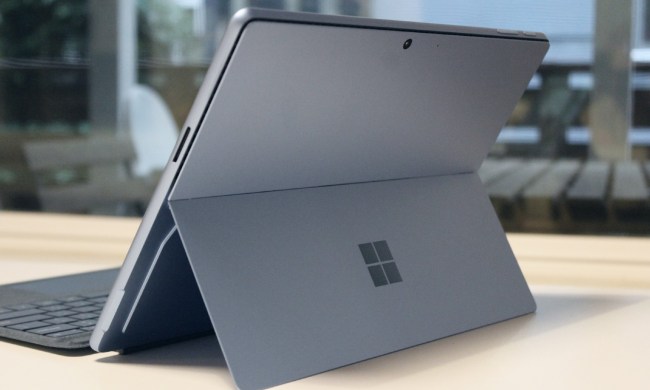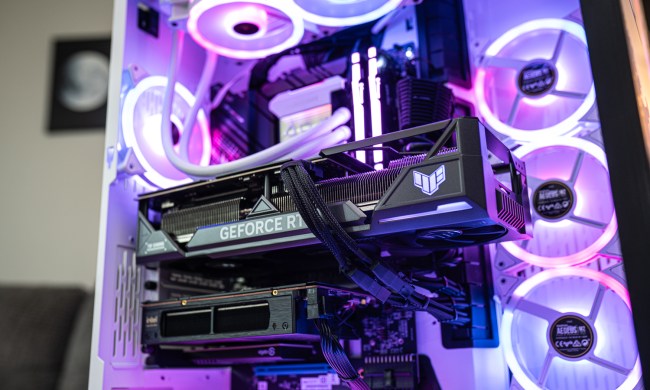AMD and Intel have fought for supremacy for decades, duking it out in a bid to make the best processors you can buy. The competition is fierce, and that's a great thing for PC enthusiasts. In 2024, the list of the best CPUs is larger than ever and packed with options from Team Red and Team Blue.
The bang-for-buck king is the Ryzen 9600X, but its last-gen 7600 counterpart is still worth considering. At the top end, for gaming we have the incredible new 9800X3D and the 9950X for productivity, while Intel's new 285K has found its own limited niche for fans of Team Blue.
Here are the best CPUs you can buy in 2025.
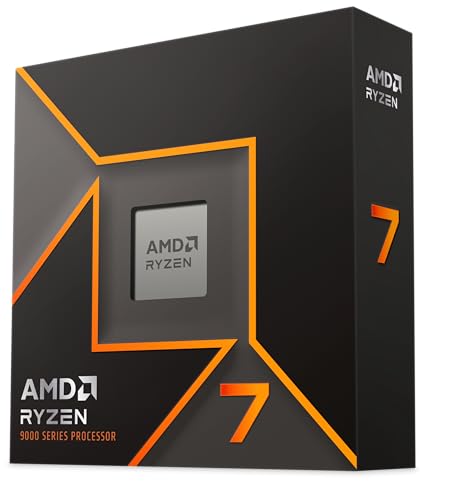












The best processor
AMD Ryzen 7 9700X
- Massive uplift from AVX-512
- Support for AM5 socket
- Cheaper than the previous generation
- Huge single-core performance improvement
- Some lopsided performance results
- 3D V-Cache is waiting in the wings
Why you should buy this: The Ryzen 7 9700X is the sleeper hit of this generation, with plenty of performance and a low price tag to boot.
Who it's for: Gamers and mainstream users who want the best balance of power and price.
Why we chose the AMD Ryzen 7 9700X:
This is a controversial pick, there's no doubt about that. The Ryzen 7 9700X wasn't a great CPU at launch, and in fact, most reviewers agreed that it was the weakest of AMD's new lineup. That's not the case anymore, due to a combination of price cuts and performance updates. The Ryzen 7 9700X is truly the sleeper hit of this generation, and it makes a lot of sense for most PC builders.
At a high level, the Ryzen 7 9700X is an easy CPU to recommend. It's an eight-core part, delivering a good balance of gaming and productivity performance, and it's reasonably priced at around $320. The big upgrade arrived after the CPU launched, however. AMD not only delivered performance improvements but also a new power mode that runs the CPU at 105 watts. And this combination makes the Ryzen 7 9700X much faster.
It's able to put up productivity performance alongside much more expensive CPUs like Intel's Core Ultra 7 265K and AMD's own Ryzen 7 9800X3D, and it can hold its own in games. Although it misses the extra juice offered by AMD's 3D V-Cache, the Ryzen 7 9700X is still a speedy gaming CPU, especially if you're planning at higher graphics settings and resolutions.


The best gaming processor
AMD Ryzen 7 9800X3D
- Exceptional productivity gains
- Fully unlocked for overclocking
- Supports existing AM5 motherboards
- Still very efficient
- Single-digit gaming gains
- More expensive than the previous generation
Why you should buy this: The Ryzen 7 9800X3D tops gaming charts, and it's not even close.
Who it's for: Gamers who want maximum performance out of their PC no matter the cost.
Why we chose the AMD Ryzen 7 9800X3D:
At this point, it shouldn't be surprising that AMD's leading 3D V-Cache CPU is the best processor for gaming. We've seen the tech at work over the course of three generations now, and even from the first release, AMD cemented itself as the gaming leader. The Ryzen 7 9800X3D didn't need to do much, and even then, it exceeded our expectations.
It's not just solid gaming performance. The Ryzen 7 9800X3D offers a nice 5% to 10% uplift over its last-gen counterpart, but more importantly, it comes with AMD's next-gen 3D V-Cache. This places the cache die under the CPU cores instead of on top of them, giving the cores more direct access to cooling. That allows AMD to push the cores harder, unlocking the ability to overclock the CPU and delivering productivity gains above 20% in most applications.
The results speak for themselves. With previous 3D V-Cache CPUs, you'd have to give up productivity performance for better gaming performance, but the Ryzen 7 9800X3D doesn't force you to choose. It's an excellent all-around CPU that just happens to blow away the competition when it comes time to play some games.

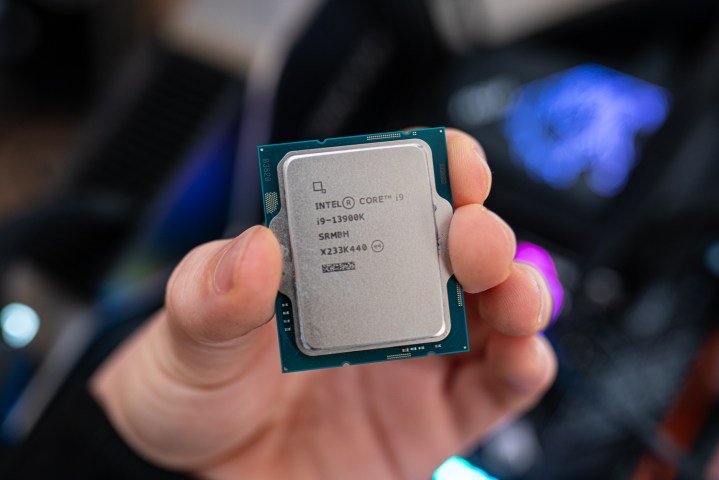
The best Intel processor for gaming
Intel Core i9-13900K
- Cheaper than AMD competition
- Support for 600-series motherboards and DDR4
- Solid multi-core improvements
- Surprising gen-on-gen improvements
- High power demands
- Small gaming performance gains
Why you should buy this: It tops performance charts in nearly every benchmark, and it's cheaper than the competition from AMD.
Who it's for: Enthusiasts who need high core counts and blistering clock speeds to accelerate video editing, compression, and other demanding tasks.
Why we chose the Intel Core i9-13900K:
Intel's 13900K might not be the flagship it once was, but it's basically the same as the 14900K, it's cheaper, and it uses less power. It's no way near as efficient as the newer 285K, either, but it's faster for gaming, so if you're looking for an Intel platform for work and play, then the 13900K is the best of the best. And it's seeing major new price drops, too.
Similar to the previous-generation's Core i9-12900K, the Core i9-13900K combines performance (P) cores and efficient (E) cores. Core counts are up this time around, though. You're getting eight P-cores designed on the new Raptor Cove microarchitecture, as well as 16 E-cores using the Gracemont architecture from the previous generation.
Those extra cores help accelerate demanding multithreaded tasks, which is why the Core i9-13900K managed an 8% lead over the Ryzen 9 7950X in Cinebench R23. The redesigned P-cores also help the Core i9-13900K outpace AMD's best by 12% in Cinebench's single-core test.
Across nearly all benchmarks, the Core i9-13900K tops the charts, aided in no small part by additional L2 cache and boosted clock speeds. It's the fastest processor you can buy, but more importantly, it comes in cheaper than AMD's Ryzen 9 7950X.
However, it can't catch up with the X3D CPUs in gaming, so you will be falling behind a little there if you opt for this powerful Intel alternative, so bear that in mind. The upgrade path is a little limited, too, as you only really have the 14th gen to move to and nothing there beyond the very top chips can compete with the 13900K.


The best value processor
AMD Ryzen 9600X
- Fast Zen 5 performance in games and productivity
- Efficient
- Single-architecture design is straightforward
- Works on any AM5 motherboard
- Not a huge performance upgrade over the Ryzen 7600X
Why you should buy this: It's one of the fastest CPUs you can buy for around $250.
Who it's for: Builders looking for the best bang for their buck.
Why we chose the AMD Ryzen 9600X:
AMD's Ryzen 9600X didn't blow the doors off when it launched in August 2024, but with recent price reductions and a few software improvements, it's become a real bang-for-buck contender for the best CPU around. With six cores, 12 threads, and a high boost-clock speed, it's a powerful midrange processor that punches well above its weight. It isn't a huge upgrade over the last-generation 7600 in gaming, but it is faster, and its productivity performance has improved by leaps and bounds, all while maintaining excellent efficiency.
It also works on any existing AM5 motherboard, meaning you don't need to upgrade your whole system if you're coming from Ryzen 7000. It supports faster memory than older CPUs, too, and it's full overclockable, so if you like to tweak your system for added performance, this chip is a great choice.
If you need more than six cores, the 7700X is around $20 more and can offer slightly better gaming performance. Pure gamers should also consider the Ryzen 9000X3D CPUs, as they're the best if you don't do any work on your machine. But for an affordable, all-rounder processor with the latest features at a great price, you can't find much better than the 9600X.


The best AMD processor
AMD Ryzen 9 7950X
- Off the charts CPU performance
- Solid gaming improvements
- Integrated graphics work for light games
- Works with most AM4 coolers
- DDR5 could bloat cost
Why you should buy this: It's insanely fast, and it's set up to support AMD's future platforms for many years.
Who it's for: AMD fans who want the best of the best and don't mind spending a little extra.
Why we chose the AMD Ryzen 9 7950X:
While it's not quite as fast as the 13900K or 14900K in gaming or productivity, and falls a few steps behind the newer 9950X, there's no denying the raw power of the Ryzen 9 7950X -- especially at close to $200 less than its successor.
The processor delivers on its promises, offering a 31% jump in single-core performance and a 36% improvement in multi-core performance compared to the previous generation. It takes a slight back seat in some tasks compared to the Core i9-13900K, but only by razor-thin margins. And in some games, like Far Cry 6, the Ryzen 9 7950X is actually a bit faster.
Beyond the processor itself, the Ryzen 9 7950X introduces AMD's AM5 platform. It used to be much more expensive, but thankfully, new motherboards and falling prices for even the best DDR5 RAM make the upgrade a little more affordable. In addition, AMD says it will support AM5 until at least 2027 (and maybe beyond). That means you can upgrade to the 9000 series or future CPU generations down the line, without changing your motherboard.
Although the Ryzen 9 7950X isn't at the peak of performance, it's just a step behind. And with features like Smart Access Memory and distant platform support on offer, it's still a very attractive flagship CPU, at a more affordable price.


The best Intel CPU
Intel Core i9-14900K
- Big improvements in gaming performance
- Same pricing as previous generation
- Works with LGA1700 socket
- AI-assisted overclocking on 14900K
- Minor productivity improvements
- Still slower than AMD 3D V-Cache chips
- Still very power hungry
Why you should buy this: Intel's previous flagship is still a monster performer, and it's much cheaper now than it was at release.
Who it's for: PC builders looking for a flagship alternative to Intel's new Arrow Lake CPUs.
Why we chose the Intel Core i9-14900K:
The Core i9-14900K is marred in controversy, but if you can look past its recent instability issues, you'll find an extremely powerful CPU available for a bargain bin price. Intel has addressed the problems with the Core i9-14900K, so as long as you have the latest updates for the CPU, you shouldn't run into issues.
Unlike Intel's new Arrow Lake CPUs, the Core i9-14900K is a fairly tame release for Intel. It's a 24-core chip with 32 threads, and it features Intel's typical array of eight performance cores and 16 efficient cores based on its Raptor Lake designs. It's basically just the Core i9-13900K, but with all of the sliders cranked to their maximum.
There are some decent productivity gains, but the Core i9-14900K's strength really lies in gaming. It's one of the few CPUs that can stand up to AMD's 3D V-Cache options, and in most games, it offers a comfortable uplift over the Core i9-13900K. You'll have to contend with higher power draw and temperatures, however — for as powerful as the Core i9-14900K is, it consumes hundreds of watts and runs hot.


The best last-gen processor for gaming
AMD Ryzen 7 7800X3D
- Chart-topping gaming performance
- Great value
- Solid multi-core and productivity performance
- AM5 is getting cheaper
- Weak single-core performance
Why you should buy this: It's easily the best gaming processor in terms of value and performance.
Who's it for: Gamers who want top-notch performance without spending more than necessary.
Why we chose the AMD Ryzen 7 7800X3D:
With the launch of the Ryzen 7 7800X3D, the 5800X3D finally has a worthy successor. This CPU is the fastest gaming CPU out there, beating Intel's Core i9-13900K by miles and even eclipsing the 14900K in most games. In pure gaming scenarios, it also keeps up with the pricier Ryzen 9 7950X3D.
The Ryzen 7 7800X3D benefits from AMD's 3D V-Cache technology, and once again, it shows off the power of adding copious amounts of L3 cache on top of the chip. It sports a total of 104MB cache, which marks a drastic upgrade from the Ryzen 7 7700X, which only comes with 40MB.
In terms of core counts, AMD seems to have stuck with what worked well for it before. The processor has eight cores and 16 threads. The boost clock speed is considerably lower than in the Ryzen 7 7700X -- the 7800X3D maxes out at 5GHz. However, it still remains far superior in gaming tasks.
This chip is insane for gaming, but it drops off a cliff in productivity tasks when you compare it to the Ryzen 9 7950X3D. However, for pure gamers, this should not be a problem. In our internal testing, the CPU hit almost the same frames per second (fps) as the more expensive part -- 239.3 versus 239.5. If you just want a solid processor for gaming, save your money and go with this one.


The best processor under $100
Intel Core i3-12100F
- Sells for under $100
- Four performance cores
- Includes a CPU cooler
- No integrated graphics
Why you should buy this: It's still a competent quad-core processor that's very inexpensive.
Who it's for: PC builders on a tight budget who want a solid processor for gaming and work without overspending.
Why we chose the Intel Core i3-12100F:
It's tough finding CPUs under $100 in 2024, but the Core i3-12100F is a standout. It's part of the Alder Lake family, and though it does have newer-generation counterparts in the 13100 and 14100, they are more expensive and don't perform much better, making the 12100F an absolute steal for a budget gaming PC.
The Core i3-12100F is a quad-core CPU that ranks among the best Intel processors you can buy. It doesn't come with a hybrid architecture, instead opting for four performance cores, but that doesn't hurt performance too much. It lacks onboard graphics, too, so you will need a dedicated graphics card with it.
Gaming is certainly possible, even if it's a bit behind the six-core Ryzen 5 5600X, and day-to-day use is excellent. This is an entry-level processor, no doubt, but the Core i3-12100F still punches above what its price would suggest.
The only caveat here is that the Core i3-14100F has been on sale at around $90 recently. If it's still there when you look it up, get that instead. It has a slightly higher clock speed and will give you a slight performance bump over the 12100.

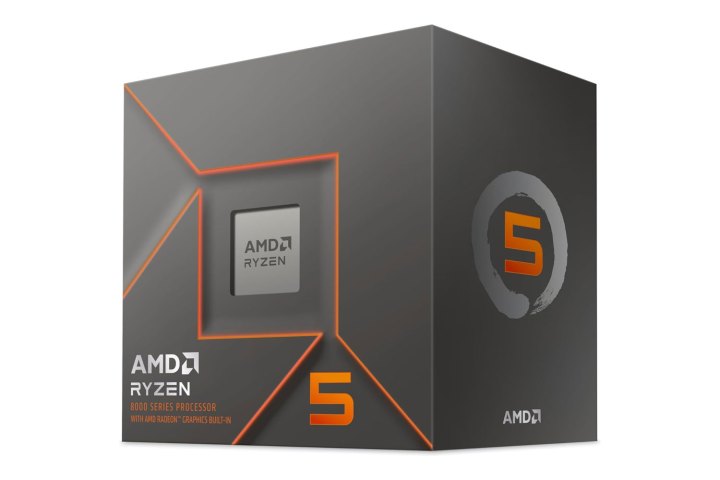
The best processor with integrated graphics
AMD Ryzen 5 8500G
- Excellent integrated graphics
- Includes a CPU cooler
- Low power draw
- iGPU isn't powerful enough for AAA gaming
Why you should buy this: It's one of the few good APUs that you can buy right now, and it's relatively cheap.
Who it's for: PC builders on a tight budget who want a solid processor for gaming and work without overspending.
Why we chose the AMD Ryzen 5 8500G:
Gaming without a GPU is possible, but it's not an ideal experience. The AMD Ryzen 5 8500G is an exception, because its onboard RDNA 3 GPU is more than capable of playing most games at 1080p medium settings at 30 frames per second (fps) in AAA games, and a far higher rate in more casual titles. It's not going to replace a dedicated graphics chip, and the CPU isn't as fast as its non-APU counterparts, but it's a great choice for GPU-free gaming.
It has six Zen4+ cores, giving it solid CPU performance, with support for 12 threads. It is limited to a 5GHz boost clock, though, which is lower than its Ryzen 7000 counterparts. Still, it has a low TDP, and if you're building a budget gaming machine, want to save money to buy a bigger graphics card later, or are putting together a compact machine that will only do light gaming, the 8500G is a great pick.
If you want more power, the 8700G is available, but it's around twice the price and its performance isn't that much better.


Best CPU for productivity
AMD Ryzen 9950X
- Compatible with existing AM5 motherboards
- Steals Intel's performance crown in productivity apps
- More efficient than Zen 4
- Dedicated 512-bit data path for AVX-512
- Little to no performance gains
- Last-gen Zen 4 options are much cheaper
Why you should buy this: It's the fastest CPU for multi-threaded workloads.
Who's it for: Developers, video editors, or anyone performing heavy, demanding tasks with their PC.
Why we picked the AMD Ryzen 9 9950X:
AMD's 9000-series didn't make any major leaps in gaming performance (look out for the X3D variants for that) but it did make some excellent gains in productivity, making the full-fat, AMD Ryzen 9950X, 16-core Zen 5 CPU the absolute pinnacle of consumer PC hardware when it comes to getting work done. With efficient Zen 5 cores, sky-high clock speeds, and boatloads of cache, the 9950X is an absolute beast for churning through heavy workloads.
The Intel 285K does give it a run for its money in a few places and select apps, but the 9950X is by far the more consistent CPU, with its single core architecture removing a lot of the headaches of Intel's Big.Little design philosophy.
The 9950X is expensive, but if you can make more money or get your work done faster by using a more powerful CPU, it's well worth the upgrade. And, though it's not marketed for gaming, it's still faster than most CPUs for that, too. It's even getting patches and updates that give it a real leg up there, so watch this space for future updates and improvements.


Best Intel CPU for productivity
Intel Core Ultra 9 285K
- Very fast multi-threading performance
- Much more efficient
- Fast in gaming
- Lots of room for overclocking
- Not as fast for gaming as last-gen flagships
- Can still consume ungodly amounts of power
- Requires whole new motherboard
Why you should buy this: It's the fastest Intel CPU for work.
Who's it for: Developers, video editors, or anyone performing heavy, demanding tasks with their PC.
Why we picked the Intel Core Ultra 9 285K:
If you want a really powerful productivity CPU, then get the Ryzen 9950X, but if you want a really powerful Intel CPU for productivity, get the 285K. It's not as good at gaming as its predecessors, but it's still plenty fast for that too. Where it really shines is in productivity, where despite having few threads, it often beats or gives the AMD 9950X a run for its money.
However, that performance is currently quite inconsistent, and though this CPU is much more efficient, it's not that efficient. Certainly not enough to warrant the problems. As Digital Trends' Jacob Roach pointed out in his review, it's a very impressive piece of kit, and does bode well for the future, but it's just not as good as it should be.
That said, if you really want the pinnacle of Intel performance in 2025, this is it. This is the best you can do. Pair it up with fast memory, and you won't be disappointed — you just might be leaving some performance on the table.

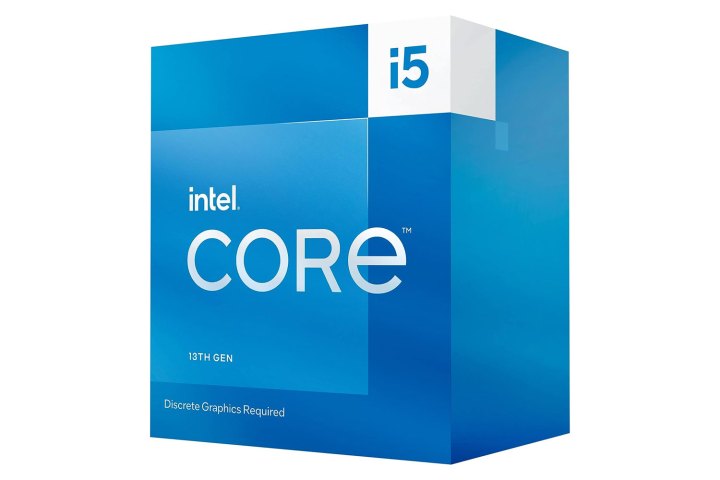
Best value Intel CPU
Intel Core i5-13400F
- Fast performance in gaming
- Efficiency cores help it punch above its weight in productivity
- Much more energy efficient than higher-end models
- Works with DDR4 and DDR5
- Cheaper than newer models
- Limited upgrade path
- Not as fast as the 14th gen equivalent
Why you should buy this: It's a CPU that punches above its weight at an affordable price tag.
Who's it for: Gamers and other users in search of a good deal.
Why we picked the Intel Core i5-13400F:
The Intel Core i5-13400F might be a last-generation chip, and it might be a little slower than the new-gen 14400, but there's a sizeable discount to be had for opting for this slightly older model. It works on the same motherboards, supports the same DDR4 or DDR5 memory, and it has the same (albeit limited) upgrade potential.
It's the cheapest Intel 13th- or 14th-generation CPU with efficiency cores, so its productivity performance is seriously impressive, rivaling much more high-end CPUs from older generations and offering credible competition for higher-end AMD CPUs. Pair it with a midrange graphics card, and this is a seriously capable chip for gaming.
As for upgrades, you'll only be able to switch it out for higher-end 13th and 14th gen chips, which does give you an upgrade path, but that's the end of it. After this generation, you'll need to switch out the motherboard for something new.

Frequently Asked Questions
The fastest processor you can buy right now is the Intel Core i9-14900K. It comes with 24 cores and high clock speeds, allowing it to rip through games and intense productivity applications. However, it has serious competition in gaming from the AMD 7800X3D and 7950X3D, both of which are far more efficient and draw far less power than the 14900K. They can't compete on productivity, but the AMD Ryzen 9 7950X, isn't far behind and is no slouch in gaming either.
Intel Core i7 and Core i5 processors are both excellent options. As the names suggest, i7 processors are faster and more powerful than i5 processors, and they're more expensive. They may not be the best choice for everyone, though.
For several generations, Intel has segmented six cores to its Core i5 processors and eight cores to its Core i7 processors. The two extra cores provide a performance boost, but they're not as important if you're gaming or running basic applications on your PC.
AMD and Intel are the main CPU manufacturers, and they tend to leapfrog each other every couple of years. Currently, Intel processors are the best option for raw performance all round, but that comes at a high power draw. For absolute gaming performance, though, AMD's X3D CPUs, like the 7800X3D and 7950X3D as the fastest out there.
See our CPU buying guide to help you make the right choice.
In short, yes. The more high-performance RAM you have (currently, you should be looking at DDR5), the better your CPU will seem. If you understand what RAM is and how it works with the CPU, you should be able to configure a system that works perfectly.




